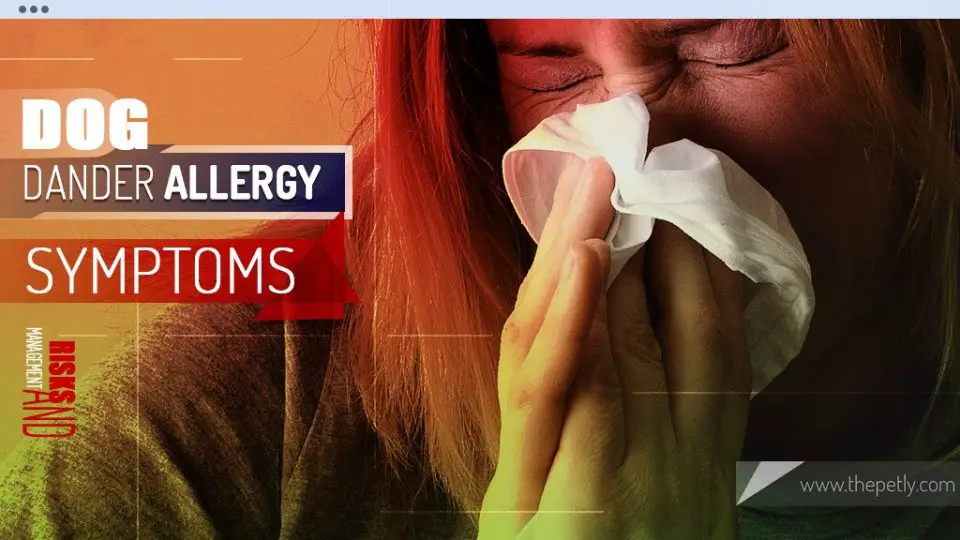Dog Dander Allergy: Symptoms, Risks, and Management

According to Asthma and Allergy Foundation of America (AAFA, up to 30 percent of people with allergies are allergic to cats, dogs, and pets in general.
As we all know, we can’t deny the loyalty and affection that our pets give freely to our families.
It can be disturbing to learn that you or your kids are allergic to your family dog despite the love you may have towards it.
Contrary to common belief, it is not the pet hair that results to allergies, but rather the proteins found in their saliva, urine, and dander.
Below, we will explore pet dander allergy and explore the common dander allergy symptoms.

NOTE: This article is NOT intended as medical advice, and is provided for informational purposes only. ALWAYS see a qualified medical practitioner for advice on dealing with allergy symptoms.
What is Pet Dander?
Pet dander refers to the tiny, and microscopic, flecks of skin shed by dogs, cats, rodents, birds, or other animals with fur and feather.
These bits of microscopic flecks can cause reactions, especially to people with sensitivity to these triggers.
Because of their miniature particle size, and jagged shape, dog dander can easily stick to beddings, furniture, fabrics, and other items in your home.
Pet dander is easily spread from your home and out to public places such as schools, restaurants, and hospitals, meaning you can get pet dander symptoms even if you don`t own a dog or live in a neighborhood with pets.
Besides the dog`s skin, the allergens may come from other sources such as saliva, urine, and feces.
For instance, if dried saliva containing allergens flakes off from the dog`s fur and becomes airborne, it can cause an allergy if inhaled by an individual sensitive to the triggers.
Another source can be dried feces. That is, when it disintegrates to dust, it is much easier to be carried by wind. And in a similar manner like flakes, carried by air movement to your home, or carried on dog hair.
Therefore, for pet dander, it`s important to realize that regardless of how long or short your dog`s hair is, it can potentially cause an allergic reaction.
How Dog Dander Affects You
Normally, the role of our immune system is to fight foreign substances such as viruses and bacteria and get rid of them.
The above response is usually initiated to protect us against the otherwise deadly diseases and infections that would stem from the bacteria.
For individuals with allergies, however, they usually have over-sensitive immune systems, meaning they overreact, even to relatively harmless substances like dog dander, pollen, saliva, and urine.
Their immune systems often react to pet dander in the same manner as harmful bacteria and viruses.
The signs and symptoms of pet dander such as sneezing, watery eyes, and coughing are the side effects of the body`s attempt to destroy or flush out the allergen.
So, what are some dog dander allergy symptoms?
Dog Dander Symptoms
Dog dander symptoms may range from mild side effects such as sneezing to severe risk factors such as respiratory infections or asthma. It all depends on the level of sensitivity of your immune system.
Again, the symptoms may manifest immediately, or over several days of contact with the dog dander.
As we found earlier, a majority of dog dander particles are microscopic, and small enough to carry into the lungs.
For some, this might cause breathing problems, and to the highly sensitive individual they can begin coughing and sneezing immediately.
Alongside coughing and sneezing can be the shortness of breath within 15 to 30 minutes of contact with the pet dander allergen.
Typically, dog dander causes the inflammation of the nasal passage, consequently resulting in;
- .
- .
- .
- .
- .
- .
- .
- .
Risk Factors
Beyond the above dog dander allergy symptoms, constant and prolonged exposure to the dog allergen may result in a myriad of respiratory complications.
Let us look at the two major complications of dog dander allergies:
Sinus infection
Chronic inflammation of the tissues in the nasal canal caused by pet allergy can result in obstruction of the hollow cavities connected to your sinuses.
In any case, the obstruction is not only bothersome but puts you at risk of developing bacterial infections such as sinusitis.
Asthma
Asthma is a chronic lung infection characterized by inflamed airways and trouble breathing.
Allergies and asthma are on a spectrum and frequency overlap because a majority of people with asthma have allergic asthma.
In most cases, asthma irritates the inflamed airways and causes the immune system to over-respond when an irritant is inhaled, thus triggering an asthma attack.
If the dog dander contributes to asthma, you may also experience;
- .
- .
- .
- .
- , .
Managing Dog Pet Dander
A majority of pet owners are sensitive to multiple allergens not just from their pet.
Therefore, they should focus on managing the allergens holistically, rather than addressing a dog dander allergen alone.
So, how do you help manage the allergens?
- .
- .
- .
- .
- breed.
Final Thought
If you are allergic to dogs, you can not get relief from the dog dander symptoms by simply avoiding dogs. And if you are a fanatic of pets, you know how hard it is to ditch your best friend.
That goes by saying, a majority of the allergic people will choose to make lifestyle adjustment such as maintain high hygienic levels.
Some OTC medications, such as antihistamines and nasal decongestants, are also handy in reducing or managing the dog dander allergy symptoms.
However, for those with severe and chronic dog dander allergies, you should seek medical advice so you don’t jeopardize your health.
NOTE: This article is NOT intended as medical advice, and is provided for informational purposes only. ALWAYS see a qualified medical practitioner for advice on dealing with allergy symptoms.



